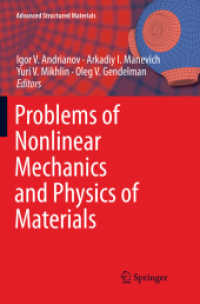- ホーム
- > 洋書
- > 英文書
- > Politics / International Relations
基本説明
Close attention to the writings of the founding fathers of the Republic of China on Taiwan shows that democracy is indeed compatible with chinese culture.
Full Description
"Conceptions of Chinese Democracy" provides a coherent and critical introduction to the democratic thought of three fathers of modern Taiwan-Sun Yat-sen, Chiang Kai-shek, and Chiang Ching-kuo-in a way that is accessible and grounded in broader traditions of political theory. David J. Lorenzo's comparative study allows the reader to understand the leaders' democratic conceptions and highlights important contradictions, strengths, and weaknesses that are central to any discussion of Chinese culture and democratic theory. Lorenzo further considers the influence of their writings on political theorists, democracy advocates, and activists on mainland China. Students of political science and theory, democratization, and Chinese culture and history will benefit from the book's substantive discussions of democracy, and scholars and specialists will appreciate the larger arguments about the influence of these ideas and their transmission through time.
Contents
Acknowledgments
1. Discussions of Democracy in the Work of Sun Yat-sen, Chiang Kai-shek, and Chiang Ching-kuo
2. Sun Yat-sen: Democracy through Unity and Elitism
3. Chiang Kai-shek: Democracy and Chinese Tradition
4. Chiang Ching-kuo: Democracy in the Context of Transition
5. Taiwanese and Mainland Chinese Democratic Thought: The Implications for Taiwan's and Mainland China's Politics
Glossary
Key Dates
Notes
Bibliography
Index








